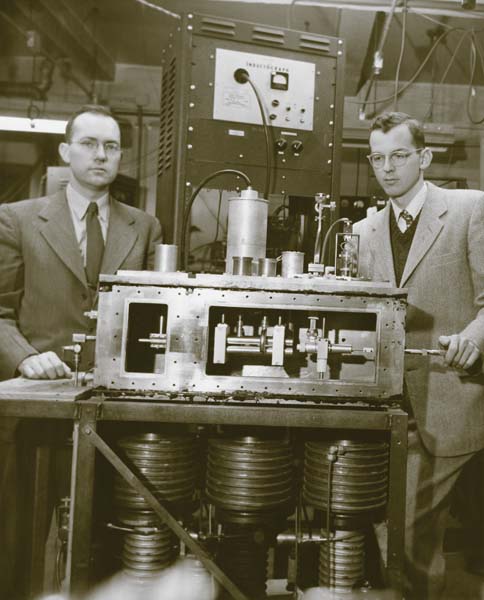Charles Hard Townes
Charles Hard Townes

Courtesy of AIP Emilio Segre Visual Archives, Physics Today Collection
Nobel Laureate and OSA Honorary Member Charles Hard Townes was born in Greenville, South Carolina, on 28 July 1915. He attended Furman University in Greenville, where he received a B.S. in physics and a B.A. in Modern Languages in 1935. Physics had fascinated Townes since his first course in the subject during his sophomore year in college because of its "beautifully logical structure". Townes completed his M.A. in physics at Duke University in 1936, and then entered graduate school at the California Institute of Technology, where he received a Ph.D. in 1939 with a thesis on isotope separation and nuclear spins.
A member of the technical staff of Bell Telephone Laboratories from 1939 to 1947, Townes worked extensively during World War II in designing radar bombing systems and has a number of patents in related technology. From this he turned his attention to applying the microwave technique of wartime radar research to spectroscopy, which he foresaw as providing a powerful new tool for the study of the structure of atoms and molecules and as a potential new basis for controlling electromagnetic waves.
At Columbia University, where he was appointed to the faculty in 1948, he continued research in microwave physics, particularly studying the interactions between microwaves and molecules, and using microwave spectra for the study of the structure of molecules, atoms, and nuclei.
In 1951, Townes conceived the idea of the maser, and a few months later he and his associates began working on a device using ammonia gas as the active medium. In early 1954, the first amplification and generation of electromagnetic waves by stimulated emission were obtained. Townes and his students coined the word "maser" for this device, which is an acronym for microwave amplification by stimulated emission of radiation.
In 1958 Townes and his brother-in-law, Arthur Schawlow, then a Stanford professor, showed theoretically that masers could be made to operate in the optical and infrared region and proposed how this could be accomplished in particular systems. This work resulted in their joint paper on optical and infrared masers, or lasers (light amplification by stimulated emission of radiation). Townes’ other research has been in the fields of nonlinear optics, radio astronomy, and infrared astronomy. He and his assistants detected the first complex molecules in interstellar space and first measured the mass of the black hole in the center of the Milky Way galaxy.
While at Columbia Townes served as executive director of the Columbia Radiation Laboratory and was chairman of the physics department. During a leave of absence he served as vice president and director of research at the Institute for Defense Analyses in Washington, D.C. In the 1960s Townes served as provost and professor of physics at the Massachusetts Institute of Technology (MIT) where his research focused on the fields of quantum electronics and astronomy. Townes left MIT in 1967 when he was appointed University Professor at the University of California.
In 1964, Townes was awarded the Nobel Prize in Physics with Nikolay Basov and Aleksandr Prokhorov for contributions to fundamental work in quantum electronics leading to the development of the maser and laser.
In 1970, he was named an Honorary Member of the Optical Society in recognition of his preeminent service in the advancement of optics. He was also an OSA Fellow.
Interest in Townes research has garnered fellowships around the globe and travels to France, Japan, Italy, Canada, Germany, and India. In addition to the Nobel Prize, Townes has received the Templeton Prize, for contributions to the understanding of religion, and a number of other prizes, including the National Medal of Science, as well as 27 honorary degrees from various universities.
Townes has served on a number of scientific committees advising governmental agencies and has been active in professional societies. This includes being a member, and vice chairman, of the Science Advisory Committee to the President of the U.S., Chairman of the Advisory Committee for the first human landing on the moon, and chairman of the Defense Department’s Committee on the MX missile. He also served on the boards of General Motors and of the Perkins Elmer Corporations.
OSA established the Charles Hard Townes Medal in 1980 to honor Charles Hard Townes, whose pioneering contributions to masers and lasers led to the development of the field of quantum electronics. It is given to an individual or a group for outstanding experimental or theoretical work, discovery or invention in the field of quantum electronics.
Charles H. Townes died on 27 January 2015, please see Optica's memorial entry.
Science is exploration. The fundamental nature of exploration is that we don't know what's there. We can guess and hope and aim to find out certain things, but we have to expect surprises.
Multimedia
Document Created: 26 July 2023
Last Updated: 28 August 2023
